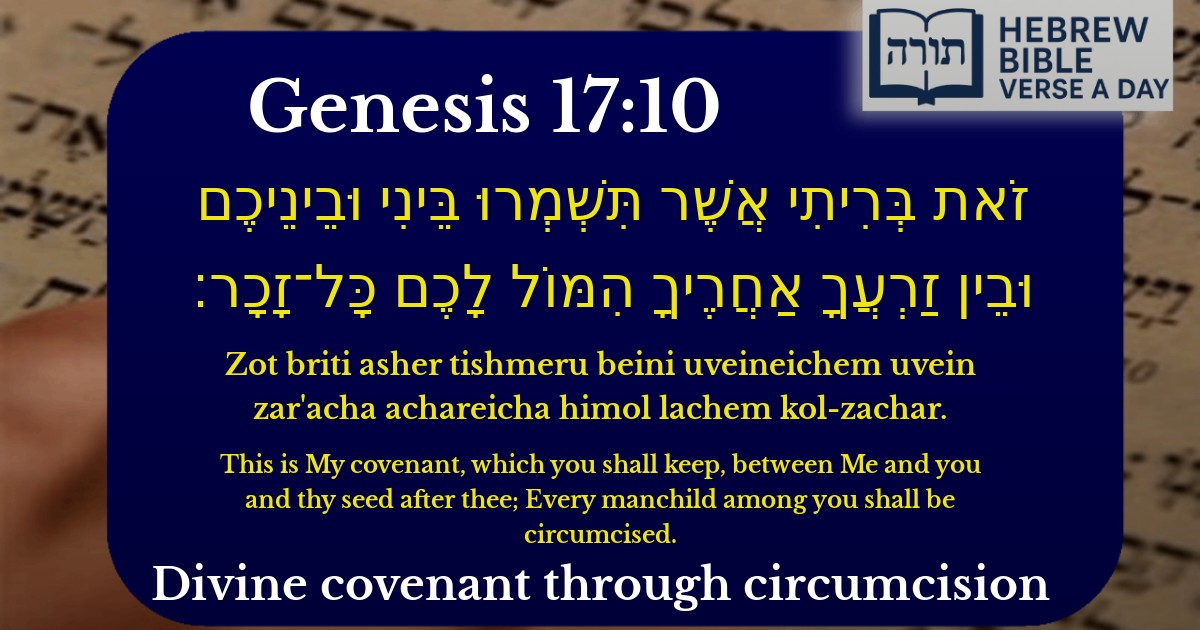Join Our Newsletter To Be Informed When New Videos Are Posted
Join the thousands of fellow Studends who rely on our videos to learn how to read the bible in Hebrew for free!
Hebrew Text
זֹאת בְּרִיתִי אֲשֶׁר תִּשְׁמְרוּ בֵּינִי וּבֵינֵיכֶם וּבֵין זַרְעֲךָ אַחֲרֶיךָ הִמּוֹל לָכֶם כָּל־זָכָר׃
English Translation
This is My covenant, which you shall keep, between Me and you and thy seed after thee; Every manchild among you shall be circumcised.
Transliteration
Zot briti asher tishmeru beini uveineichem uvein zar'acha achareicha himol lachem kol-zachar.
Hebrew Leining Text
זֹ֣את בְּרִיתִ֞י אֲשֶׁ֣ר תִּשְׁמְר֗וּ בֵּינִי֙ וּבֵ֣ינֵיכֶ֔ם וּבֵ֥ין זַרְעֲךָ֖ אַחֲרֶ֑יךָ הִמּ֥וֹל לָכֶ֖ם כׇּל־זָכָֽר׃
זֹ֣את בְּרִיתִ֞י אֲשֶׁ֣ר תִּשְׁמְר֗וּ בֵּינִי֙ וּבֵ֣ינֵיכֶ֔ם וּבֵ֥ין זַרְעֲךָ֖ אַחֲרֶ֑יךָ הִמּ֥וֹל לָכֶ֖ם כׇּל־זָכָֽר׃
🎵 Listen to leining
Parasha Commentary
📚 Talmud Citations
This verse is quoted in the Talmud.
📖 Shabbat 132a
The verse is cited in a discussion about the commandment of circumcision and its importance in the covenant between God and Abraham.
📖 Nedarim 32a
The verse is referenced in a discussion about the significance of circumcision as a divine commandment and its role in the covenant.
📖 Avodah Zarah 27a
The verse is mentioned in the context of discussing the obligations of the covenant and the commandment of circumcision.


The Covenant of Circumcision (ברית מילה)
The verse states: "זֹאת בְּרִיתִי אֲשֶׁר תִּשְׁמְרוּ בֵּינִי וּבֵינֵיכֶם וּבֵין זַרְעֲךָ אַחֲרֶיךָ הִמּוֹל לָכֶם כָּל־זָכָר" ("This is My covenant, which you shall keep, between Me and you and thy seed after thee; Every manchild among you shall be circumcised"). This establishes ברית מילה (the covenant of circumcision) as an eternal bond between Hashem and the Jewish people.
Rashi's Explanation
Rashi (Bereshit 17:9) emphasizes that the phrase "זֹאת בְּרִיתִי" ("This is My covenant") refers specifically to the mitzvah of מילה (circumcision). He explains that this is the foundational sign of the covenant with Avraham Avinu and his descendants, distinguishing them as Hashem's chosen people.
Rambam's Perspective
In Mishneh Torah (Hilchot Milah 1:1), the Rambam teaches that circumcision is one of the 613 mitzvot and is incumbent upon every Jewish male. He notes that its significance is so great that one who neglects it is considered to have transgressed a severe commandment, as it is the physical mark of our relationship with Hashem.
Midrashic Insights
Halachic Implications
The Talmud (Kiddushin 29a) rules that a father is obligated to circumcise his son on the eighth day, as derived from this verse. The Shulchan Aruch (Yoreh De'ah 260:1) codifies this as halacha, emphasizing the importance of performing the mitzvah at the proper time.
Spiritual Significance
Rabbi Samson Raphael Hirsch (Bereshit 17:9) explains that circumcision represents the subjugation of physical desires to spiritual ideals. By marking the organ of procreation, we dedicate even our most basic human drives to the service of Hashem.